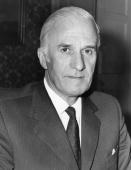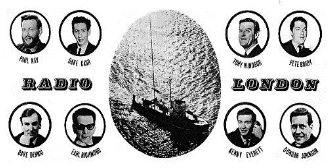© 2014-


Radio London - History (3)
In these latest negotiations Smedley had offered Calvert cash for Project Atlanta to purchase Radio City outright or, alternatively, the equivalent amount of shares in a joint operating company. Reg Calvert remained non-
However, in an argument over ownership of the obsolete transmitter Radio City was put off the air by a boarding party in June 1966 and Reg Calvert made threats of violence at a meeting with Project Atlanta and Radio London. In a subsequent incident Reg Calvert was shot dead. (See Radio City for the full story) Radio London immediately withdrew from the agreement to launch UKGM when Managing Director, Philip Birch, saw Calvert's threatening behaviour and the subsequent events meant this particular project was never launched.
The Radio City affair, with its graphic demonstration of anarchic and violent behaviour spelt the beginning of the end for all British offshore broadcasters -
Two days after the 1st July announcement that legislation would now be introduced before the summer recess Postmaster General Anthony Wedgewood Benn was replaced in a Cabinet reshuffle by a new Minister, Edward Short. He was to adopt a far more positive and aggressive attitude towards outlawing the offshore broadcasters and a few days after taking up his appointment Mr. Short announced that once they had been closed the offshore stations would not be replaced by local commercial stations -
The Bill to outlaw offshore broadcasting stations - 6 and received its formal First Reading.
6 and received its formal First Reading.
The initial reactions from the offshore stations to the Bill were defiant, containing general expressions of determination to fight its introduction and continue broadcasting.
Radio London's Managing Director, Philip Birch, promised to move the station's headquarters abroad, to supply the ship from Spain and Holland and obtain advertising from New York and Paris. He went on to state that the Bill would discriminate against British manufacturers who would no longer be able to use Radio London to advertise their products. Radio London, he said, would still be broadcasting in 30 years’ time.
1967
During March and April 1967 Radio London commissioned a survey of candidates in the Greater London Council (GLC) elections to establish who supported or opposed the offshore stations. The results, which were repeatedly broadcast by Radio 270 and Radio Caroline as well as Radio London itself showed the following breakdown of candidates' views :-
FOR AGAINST DON’T KNOW
Labour 4 23 1
Liberal 28 6 0
Conservative 38 0 0
An opinion poll of MPs was also conducted at the same time and this showed, not surprisingly, that the majority of (Labour) Government's MPs wanted the stations to be closed, while 65% of opposition (Conservative) MPs were in favour of the service provided by offshore radio.
At the end of May 1967 thre e transmitter valves were delivered to the Radio London vessel Galaxy, so that, from a technical point of view, the station would be able to continue broadcasting for anything up to six years. The station also set up an office in Holland to act as a supply base and announced that in future it would rely almost entirely on American advertising income.
e transmitter valves were delivered to the Radio London vessel Galaxy, so that, from a technical point of view, the station would be able to continue broadcasting for anything up to six years. The station also set up an office in Holland to act as a supply base and announced that in future it would rely almost entirely on American advertising income.
The Marine etc. Broadcasting (Offences) Act received the Royal Assent on 14th July 1967 and Postmaster General Edward Short announced that its provisions would come into effect one month later, on 15th August 1967. One by one the offshore stations gave their reactions to this news and on 28th July 1967, Radio London listeners were told in a dramatic announcement that, contrary to previous statements, the station would not continue broadcasting after 15th August 1967.

Announcement of Radio London’s closure


Click on picture to enlarge
One of the anti Marine Offences Act promos aired by Radio London

The new Postmaster General, Edward Short

History
Key Dates
Ship and Location
Technical
Staff
Programmes





Treasure Chest


Horlicks



Weetabix







Back to Britain Gallery


Back to Radio London
